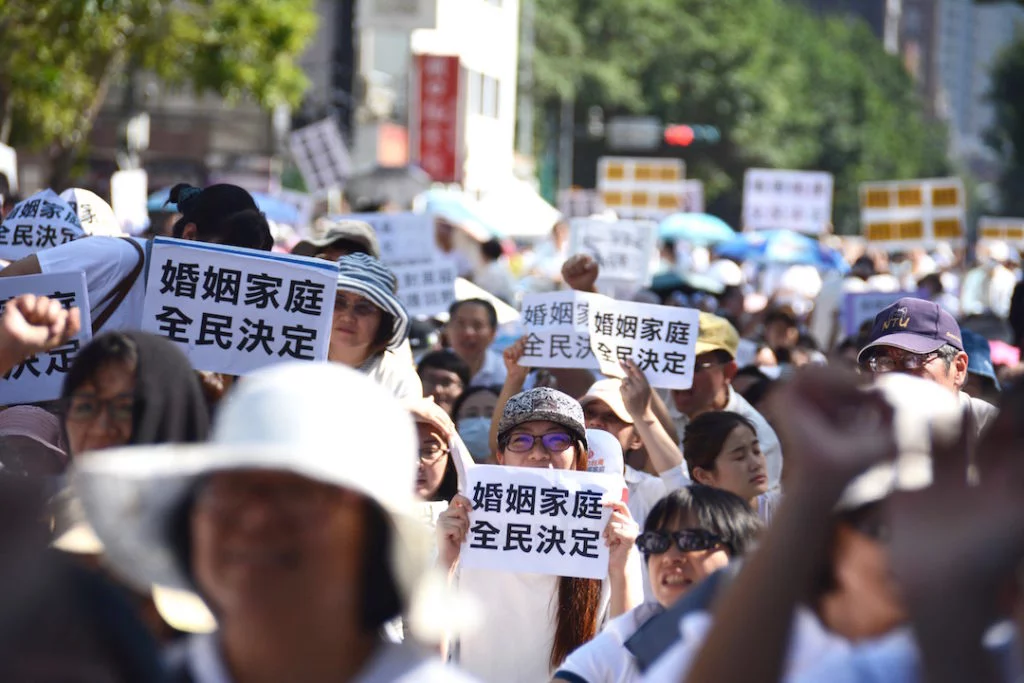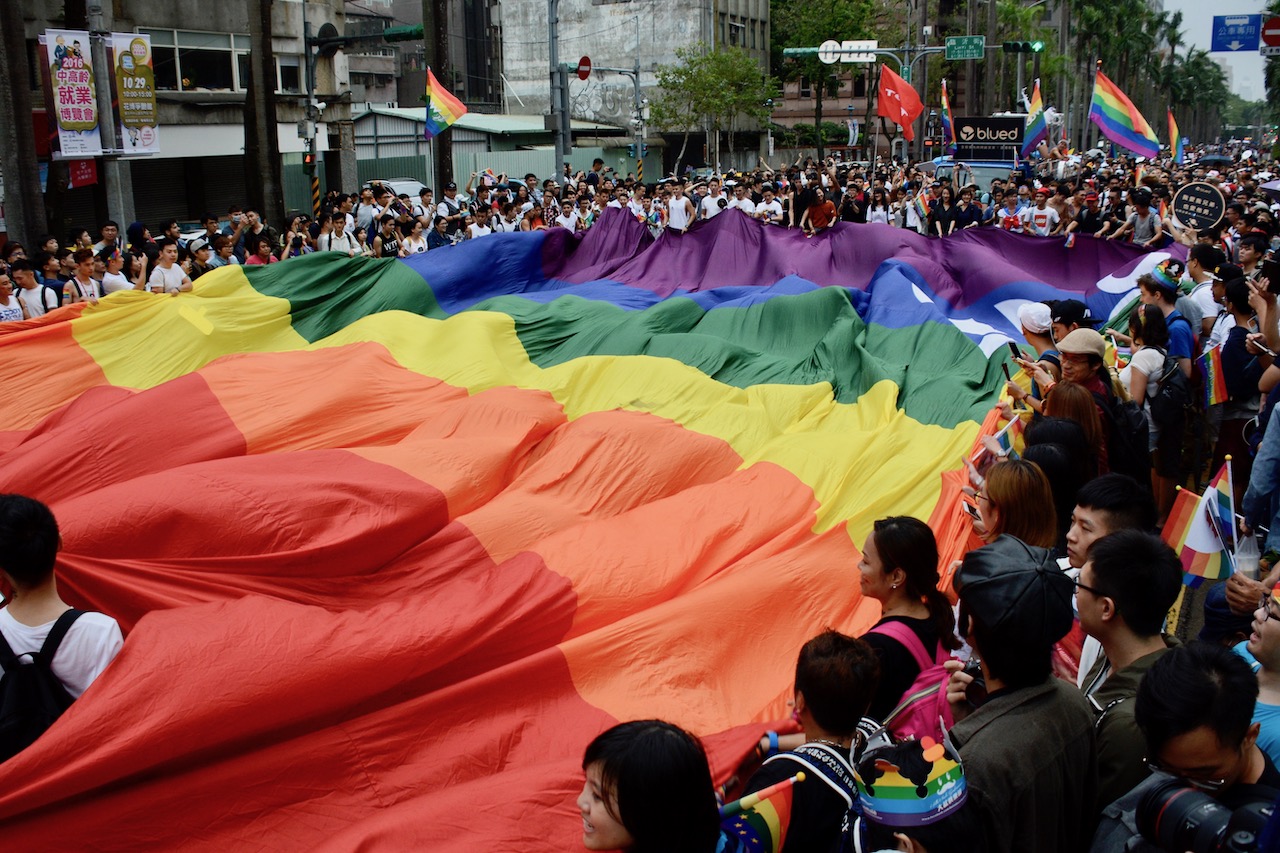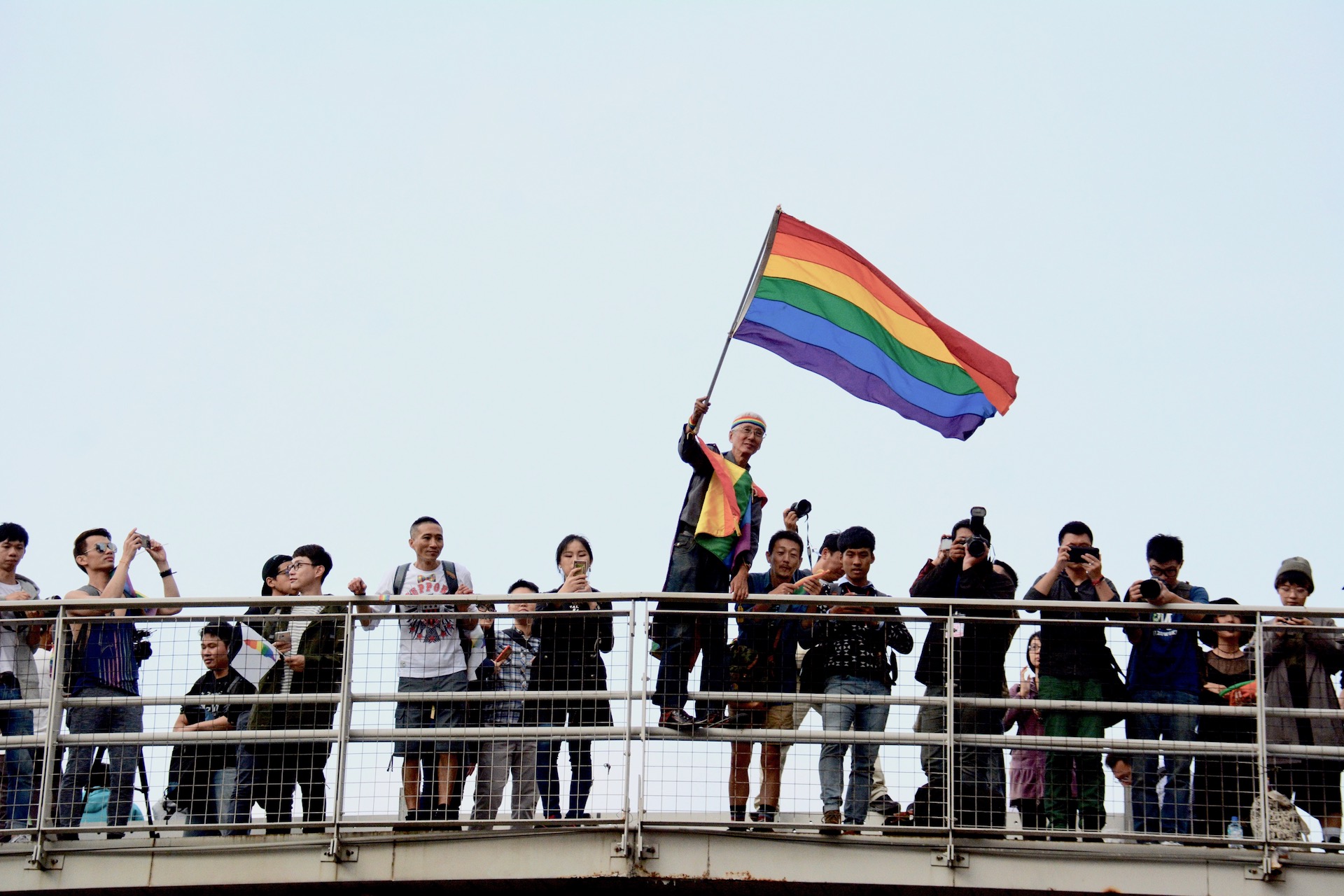Taiwan has become increasingly tolerant on gay issues over the years. But partisan differences, framing, and linking same-sex marriage legalization to broader themes may not encourage support. In some cases, it could even create a backlash.
With draft legislation introduced in December, Taiwan is poised to be the first country in East Asia to legalize same-sex marriage. Prior to the 2016 legislative elections, a majority of Democratic Progressive Party (DPP) legislators supported legalization, while a majority of Kuomintang (KMT) legislators had no public stance (see here or here). In 2016, the New Power Party (NPP) joined the DPP in support, with every NPP legislator publicly stating his or her support for legalization. All three parties later proposed bills in 2016.
Such support contrasts with 2005, where a proposal for legalization was quickly blocked, and 2013 efforts which stalled in committee. According to Pridewatch, now a majority of legislators (57.5%) have voiced their support for legalization, compared to 10.6% identified as in opposition. However, even within the DPP, only 46 legislators (67.6%) are on record in support.
As legalization receives greater attention, public opposition has also grown, assisted by U.S.-based anti-gay organizations, with at least one survey finding a majority opposing legalization and limited calls for recall elections of legislators supportive of legalization (see here and here). The Tsai Ing-wen administration has also de-emphasized legalization since May, ultimately supporting a Same Sex Partnership Act rather than a Marriage Equality Act, distancing itself from a more supportive legislature, with Tsai later meeting with representatives supportive and opposed to legalization.
Identifying public opinion on legalization remains a moving target (see here), with few studies until the last five years. Public opinion on related issues shows a clear increase in tolerance in Taiwan over the past 20 years. According to data from the World Values Survey, 73% of respondents in 1995 stated they did not want homosexuals as neighbors and 64% stated homosexuality was never justifiable, with rates of both decreasing in 2012 (41% and 24% respectively). Furthermore, rarely has raw survey data been released to allow for independent assessment of what demographic or attitudinal factors shape support for same-sex marriage. For example, the 2012 Taiwan Social Change Survey (TSCS) shows a slight majority (52.5%) agreed that “homosexuals should have the right to marry,” surprisingly with greater support among KMT supporters (55.7%), versus only 47.8% of DPP supporters. However, further analysis finds that much of this variance is due to demographic differences that corresponded with party identification.
Nevertheless, as time has passed there has been a significant increase in those that support passing legislation in favor of same-sex marriage, which reached its peak at 71% as recorded by the Police Research Association poll commissioned by the Ministry of Justice in 2015. It is the occurrence of such drastic changes like this that led us to create a survey to examine the current perceptions of same-sex marriage and what factors influence support.
Gauging Support
Through an experimental web survey conducted through PollcracyLab in early December we randomly assigned 601 Taiwanese respondents to receive one of eight prompts to assess whether framing and partisan cues influenced support for same-sex marriage. Our assumption was simple: those who have strong preferences in support or opposition are unlikely to be swayed by how legalization is portrayed, whereas a sizable portion of the population, on an issue that historically has not been electorally salient, are persuadable.
The prompts ranged from a simple baseline version (“Taiwan is considering legalizing same-sex marriage. Which of the following options best represents your view on legalization of same-sex marriage?”) to versions which mentioned that 21 countries already have legalized same-sex marriages, that Taiwan would be the first in Asia, that proponents view legalization as a sign of tolerance and diversity or the quality of Taiwan’s democracy or Taiwan’s progressiveness, that the DPP and NPP supported legalization, or that 59 legislators (52.2%) support legalization (this number increased since the survey was administered).
Besides typical demographic questions (age, gender, education, income), and partisan identification, we included three questions regarding likely related to support for same-sex marriage legalization: whether one was gay, whether one knew Taiwanese that were gay, and finally whether a gay person would be welcome in their family. We also included a series of questions from Asianbarometer which combined attempts to measure traditional (often viewed as Confucian) values. Unfortunately, our study did not include a measure of religious affiliation, which we would assume influences perceptions. For example, a 2013 research paper from the Ministry of Justice《臺灣同性婚姻法制化之調查研究》included survey data revealing that individuals who did not adhere to any religion or did not have a fixed religious adherence had the highest levels of support for same-sex marriage, with 70.9% and 58.5% respectively, while adherents to Christianity and traditional Buddhism had the highest levels of disapproval toward the idea of same-sex marriage, with 65.9% and 55.9%, respectively. Such findings are somewhat consistent with survey data in South Korea about LGBT perceptions based on the respondent’s religion.

Opponents of same-sex marriage protest outside the Legislative Yuan in Taipei on Nov. 17, 2016 (Photo: J. Michael Cole).
Overall our sample suggests a lack of consensus on legalization, with 40.26% supporting legalization, 27.29% opposed and 32.45% neither opposed nor supported. Support was predictably higher among DPP and pan-green supporters (51.22% and 57.41% ) compared to KMT and pan-blue supporters (21.52% and 21.46%). In addition, majorities of respondents stated that they knew a Taiwanese person who was gay (59.07%) and that a gay person would be welcome in their family (53.91%). As expected, identifying as gay, knowing Taiwanese that were gay, and willingness to accept a gay person in one’s family corresponded with support, while our measure of traditional values corresponded with a decline in support.
Overall our sample suggests a lack of consensus on legalization, with 40.26% supporting legalization, 27.29% opposed and 32.45% neither opposed nor supported.
More importantly, we find that the effects of how legalization is framed influences support among subgroups. In particular, among KMT or pan-blue supporters more broadly, highlighting that Taiwan would be first in the region to legalize same-sex marriage appears to lower support for legalization. Meanwhile none of the randomizations had any statistically significant influence on DPP or pan-green supporters more broadly. Among those who did not identify with parties within either coalition, that a majority of legislators already supported legalization also appeared to negatively influence levels of support. These patterns held after controlling for demographic factors.
Taiwan’s broader tolerance, including on LGBT issues, has been attributed to a variety of factors, to cultural components to Western influences. Our survey findings suggest partisan differences in how framing influences perceptions and that linking legalization to broader themes may not encourage support but possibly feed into a backlash. The path to legalization of same-sex marriage in most countries has been through the legislature (the U.S. is a notable counter-example). The new legislative session started in February and while same-sex marriage has not been put on the agenda, continued interparty debates on the wording of the legislation will likely slow the process again. For example, it remains unclear whether legalization requires a separate law or altering the existing civil code, while simply altering the existing code appears easier said than done, with little consensus across parties on how many of the articles need revision (also see here). Meanwhile, legislators and party officials concerned about the electoral consequences of legalization, especially considering the potential ramifications for 2018 local elections, may need to consider alternative means of framing the issue to win over those undecided.
You might also like
More from Society & Culture
Media and Free Expression in Taiwan Are Under Attack: What Can be Done?
How can we avoid the imposition of a blanket silence which can only empower our enemies and damage our democracy? …
Taiwanese Views on Homosexuality Based on Proximity of Relationship, Study Shows
The legalization of same-sex marriage in Taiwan should be viewed not just as a culmination of years of advocacy efforts …
Challenges Remain Following the Legalization of Same Sex Marriage in Taiwan
Despite the adoption of a new law on May 17, campaigns will continue to legitimize the kind of homophobic discourse …









